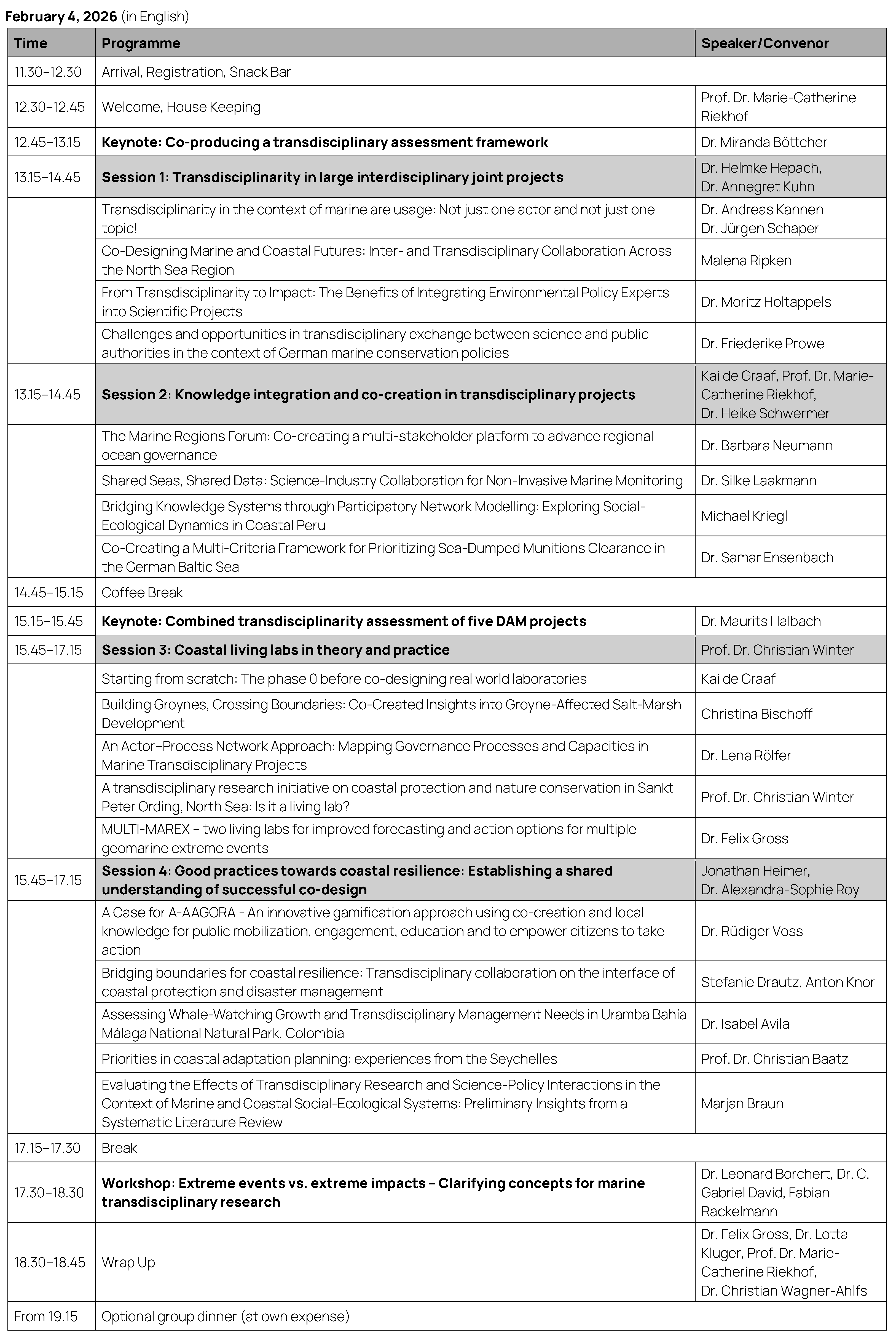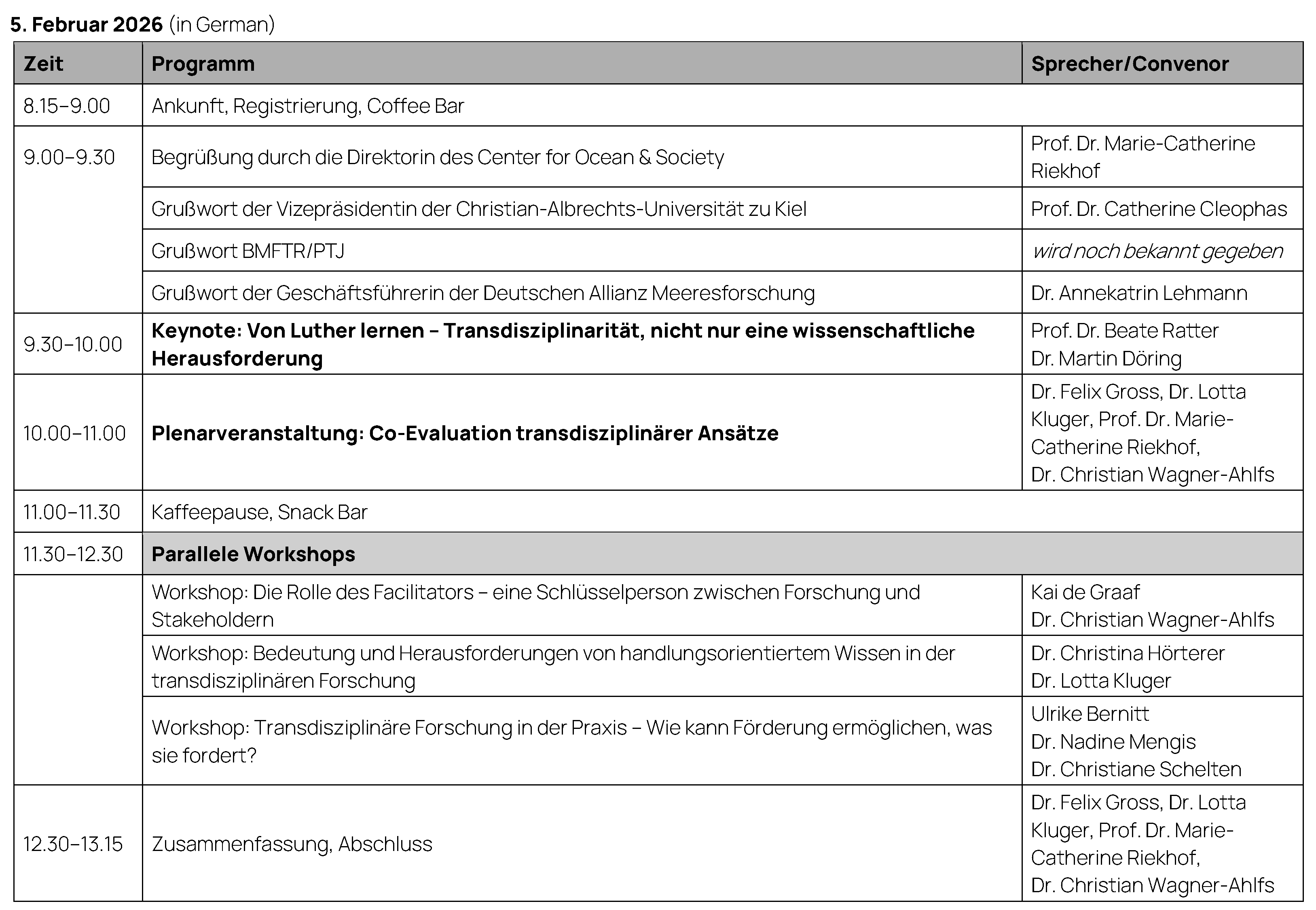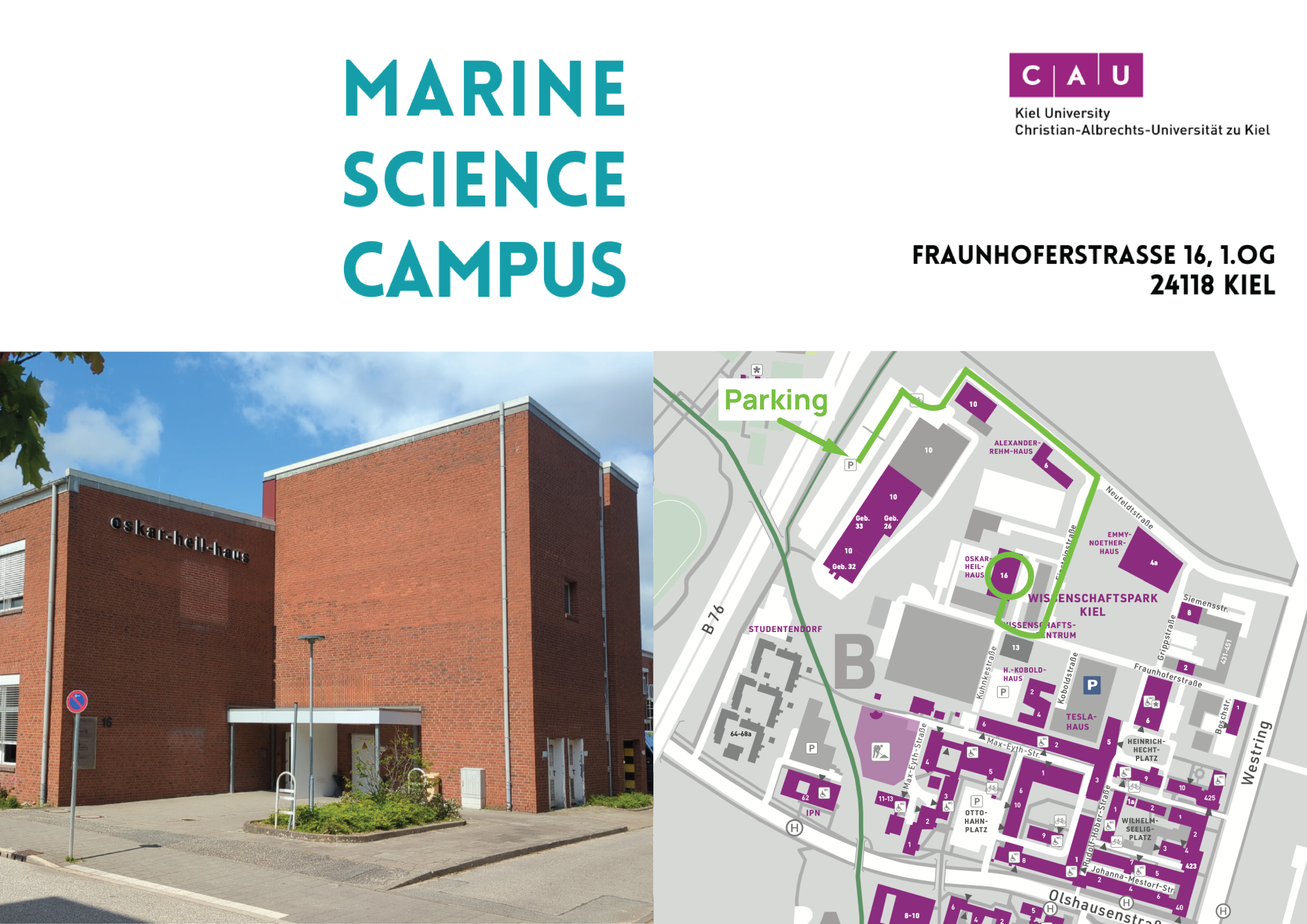Events of the Center for Ocean and Society
Conference — Marine Transdisciplinarity: Co-evaluating the status quo and c...
Conference — Marine Transdisciplinarity: Co-evaluating the status quo and co-designing the way forward
05.02.2026
Information page

Conference — Marine Transdisciplinarity: Co-evaluating the status quo and co-designing the way forward
Dates: February 4–5, 2026 (from noon to noon)
Venue: Marine Science Campus, Kiel University, Fraunhoferstr. 16, 24118 Kiel
This conference aims to reflect on transdisciplinary research activities, theories, and results in marine research, with a special focus on the three research missions of the German Marine Research Alliance (DAM). The event will bring together researchers, stakeholders, and practitioners to:
Exchange experiences and insights from transdisciplinary projects
Develop a common understanding of terms, methods, and approaches in transdisciplinary research
Co-evaluate research results and co-design future strategies
Enhance the effectiveness of transdisciplinary approaches for sustainability transformations
Contact
Dr. Henrike Mütze
Organizing team: Prof. Marie-Catherine Riekhof, Dr. Christian Wagner-Ahlfs, Dr. Lotta C. Kluger, Dr. Felix Gross (Center for Ocean and Society, Kiel University)
Program


Session and Workshop Details
Day 1: February 4, 2026 (in English)
Session 1: Transdisciplinarity in large interdisciplinarity joint project
By accumulating in depth expertise from a broad range of disciplines and individual researchers, interdisciplinary joint projects manifest numerous premises for innovative and socially relevant knowledge creation. At the same time, inherent (thematic, disciplinary and geographical) heterogeneity of such research projects generates specific challenges for transdisciplinary research activities, which are often locallybounded and rather issue-specific. The session wants to reflect on and discuss these challenges, as well as possible methodological and conceptual approaches of transdisciplinary research to face them. It aims at presenting and discussing practical experiences of inter- and transdisciplinary marine research approaches within the three research missions of the German Marine Research Alliance (DAM) in a comparative perspective. The session invites contributions from researchers as well as stakeholders involved in one of the DAM missions. Contributions should critically focus on practical challenges of effective transdisciplinary research within large interdisciplinary joint projects from the first phase of the DAM-research missions, and should present approaches and specific methods, which have been elaborated to address these challenges.
Convenors:
Annegret Kuhn Center for Ocean & Society, Christian-Albrechts-Universität zu Kiel, Kiel
Helmke Hepach GEOMAR Helmholtz Centre for Ocean Research Kiel, Kiel
Maurits Halbach Helmholtz Institute for Functional Marine Biodiversity at the University of Oldenburg, Oldenburg
Session 2: Knowledge integration and co-creation in transdisciplinary projects
Scientific knowledge and practical knowledge can enhance each other, potentially leading to new research insights and questions, and co-creating sustainable solutions to pressing societal problems. However, in practice this knowledge integration is a challenge! In this session, we aim to discuss multiple experiences in the field of knowledge integration from a scientific and a stakeholder’s point of view, drawing on different methodological approaches and case studies. We invite contributions from research projects and papers that present related examples addressing the following questions:
• Why are diverse knowledge types essential in general / for your project? For what purpose and how is it used for co-creation?
• What best practices emerged from your project, and can they serve as guidelines for knowledge integration in transdisciplinary projects more generally?
• Which barriers did you encounter when integrating various knowledge types into transdisciplinary projects?
• What kind of key determinants of successful participation in transdisciplinary processes did you encounter?
• How did you deal with the differences in, for example, motivation, narratives and rationales between science and practice?
• What new knowledge has been co-produced? The list of questions only presents a selection of potential topics to be discussed.
Convenors
Heike Schwermer, Marie-Catherine Riekhof & Kai de Graaf Institut für Agrarökonomie, Christian-Albrechts-Universität zu Kiel, Kiel, Center for Ocean & Society, Christian-Albrechts-Universität zu Kiel, Kiel
Session 3: Coastal living labs in theory and practice
Real-world laboratories are transdisciplinary research methods that are rewarding but also very demanding. Often it is not possible to realise a full living lab concept in applied transdisciplinary research projects. This session discusses the implementation of different elements of living labs to make up a good transdisciplinary project. Theoretical concepts shall be discussed on examples of past or ongoing projects. What are the criteria for a successful project with or without a real-world laboratory?
Convenor:
Christian Winter Christian-Albrechts-Universität zu Kiel, Kiel
Session 4: Good Practices Towards Coastal Resilience: Establishing a Shared Understanding of Successful Co-Design
Research projects co-designed with communities are expected to encompass multiple perspectives, acknowledge traditional and local knowledge, as well as balance diverse priorities. While this approach fosters tailor-made solutions, ownership, and uptake, it also complicates the assessment of success. Success can be defined in multiple ways, including scientific excellence, improved livelihoods and ecosystems, revenue generation, or community contentment etc. In co-designed projects, where multiple stakeholders come together, a uniform definition of success is often vague or nonexistent. As marine sciences enter a time when it is expected to co-deliver solutions, an urgent discussion is needed on what a shared set of success indicators could encompass. This topic is central to transdisciplinary research, addressing how diverse knowledge, disciplines, and societal needs can be integrated into shared frameworks for evaluating impact. Drawing on participants’ experiences, the session intends to get one step closer to establishing adaptable frameworks of success indicators. By looking at takeaways from existing projects, such as the DAM missions, it aims to identify critical aspects for sustainable and effective impact. In doing so, it addresses the practical application of transdisciplinary research i.e., How collaborative approaches can translate codesigned science into measurable success. The session invites contributions focusing on case studies, conceptual approaches, or methodological reflections on defining and evaluating success in co-designed or community-driven projects. The outcome will be a concise science report to be shared within the broader community. The session will also serve to connect the German community to the All-Atlantic Network of Coastal Resilience Beacon Sites.
Convenors:
Alexandra-Sophie Roy & Jonathan Heimer German Marine Research Consortium
Workshop 1: Extreme Events vs. Extreme Impacts – Clarifying Concepts for Marine Transdisciplinary Research
The distinction between “extreme events” and “extreme impacts” is conceptually important but often blurred in practice, which creates a barrier for cooperation between practionners and scientists. The aim of this workshop is to co-develop a common conceptual basis for analyzing extreme events and impacts, thereby strengthening the capacity of transdisciplinary collaborations to address marine risks and sustainability challenges.
This problem is particularly pronounced in marine and coastal research: extreme events (e.g., storm surges, heatwaves, tsunamis) refer to the probabilistic tail ends of physical or environmental variables (e.g., wave height, water temperature), while extreme impacts emerge from the interaction of hazards with exposure, vulnerability, and responses. The IPCC risk framework makes clear that an extreme event does not necessarily translate into extreme impacts, and conversely, that severe impacts can arise from events of moderate intensity under conditions of high vulnerability. This session will introduce and critically discuss these distinctions and related concepts by drawing on the experiences made in the mareXtreme research mission. It presents novel conceptual additions on how extreme events are shaped, like the systemic risk concept, to provide entry points to address them in marine transdisciplinary research. Clarifying these terms and conceptual connections is crucial for building shared understanding across natural and social sciences as well as actor and stakeholder communities.
After a short conceptual input presentation and the application of it to past coastal extreme events, participants will be invited to reflect and apply the concept to their project/work contexts and discuss open questions.
Convenors:
Fabian Rackelmann United Nations University Institute for Environment and Human Security (UNU-EHS), Bonn
C. Gabriel David Technische Universität Braunschweig, Braunschweig
Day 2: February 5, 2026 (in Deutsch)
Workshop 2: Die Rolle des Integration Experts – eine Schlüsselperson zwischen Forschung und Stakeholdern
Transdisziplinäre Projekte erfordern eine engagierte Fachkraft, die Dialoge, Wissenstransfer sowie die Kommunikation zwischen Forschung und Stakeholdern initiiert, koordiniert, organisiert und vorantreibt. Zudem sollte sie mit einer Reihe Problemlagen umgehen können, z.B. Missverständnisse und Konflikte sowie ungenutzte Potenziale aufzudecken. Diese Rolle hat verschiedene Titel, wie etwa „Integration Expert“ oder „Wissensintegrator:in“. Doch was kennzeichnet diese Rolle, die deutlich über eine Moderation hinaus geht?
In diesem Workshop werden wir zunächst eine Übersicht geben, was die Rolle eines Facilitators beinhaltet, welche Kompetenzen notwendig sind und wie diese erworben werden können. Anschließend sammeln wir Erfahrungen der Teilnehmenden, welche Kompetenzen bereits von „Integration Experts“ in der transdisziplinären Meeresforschung eingesetzt werden.
Der Workshop verbindet kurze Inputs mit interaktiven Formaten, um die Perspektiven der Teilnehmenden einzubinden und eine praxisnahe, aktuelle Übersicht zu Kompetenzen, Tools und Best Practices für Facilitating in der transdisziplinären Meeresforschung zu erstellen. Folgende Fragestellungen führen durch den Workshop:
Was sind zentrale theoretische und praktische Kompetenzen für Facilitator, und wo können diese erworben werden?
Doppel-Rolle: Können Forscherinnen und Forscher gleichzeitig forschen und als Facilitator arbeiten – oder braucht es hierzu eine externe Person?
Erfolgsfaktoren und Herausforderungen: Welche Erfahrungen bringen Sie aus Ihren Projekten mit?
Convenors:
Kai de Graaf & Christian Wagner-Ahlfs
Center for Ocean and Society, Christian-Albrechts-Universität zu Kiel, Kiel
Workshop 3: Bedeutung und Herausforderungen von handlungsorientiertem Wissen in der transdisziplinären Forschung
Handlungsorientiertes Wissen gewinnt in Bezug auf notwendige Anpassungen an den Klimawandel sowie umfassende Nachhaltigkeitstransformationen stark an Bedeutung. Besonders die transdisziplinäre Forschung verfolgt das Ziel, handlungsorientiertes Wissen („Handlungswissen“) zu schaffen, welches in der Praxis umsetzbar ist.
Handlungswissen bezieht sich dabei auf Erkenntnisse, die zur Lösung gesellschaftlicher Probleme beitragen und auf konkrete Handlungen sowie Veränderungsprozesse verweisen. Ein Weg zur Generierung von handlungsorientiertem Wissen ist die Integration verschiedener Wissensformen aus Forschung und Praxis, um ein umfassenderes Verständnis und anwendbare Lösungen zu ermöglichen.
Die Erfahrungen aus den DAM-Missionen zeigen jedoch, dass ein gemeinsames Verständnis von Handlungswissen und dessen Generierung fehlt. Die Ursachen hierfür liegen sowohl in den unterschiedlichen Definitionen und Herangehensweisen der einzelnen Disziplinen als auch dem institutionellen Rahmen, in dem Handlungswissen generiert wird.
Ziel des Workshops ist es, in einer strukturierten Diskussion Barrieren bei der Generierung von Handlungswissen an der Schnittstelle von Wissenschaft, Gesellschaft und Politik innerhalb der DAM-Forschungsmissionen zu identifizieren, sowie Kriterien und mögliche Lösungsansätze für deren Abbau gemeinsam zu erarbeiten. Im Mittelpunkt steht die Frage, unter welchen Voraussetzungen die Entwicklung von Handlungswissen gefördert werden kann und wie entsprechende Kapazitäten innerhalb der DAM aufgebaut werden können, um die gesellschaftliche Wirkung transdisziplinärer Forschung zu stärken.
Die erarbeitete gemeinsame Grundlage wird in ein Positionspapier integriert, das die effektive Wissensproduktion nach wissenschaftlichen und gesellschaftlichen Bedürfnissen fördert. Wir freuen uns über Teilnehmende aus allen Disziplinen und der Praxis für eine möglichst diverse Reflektion der Bedeutung und dem Verständnis von Handlungswissen.
Convenors:
Christina Hörterer Alfred-Wegener-Institut Helmholtz Zentrum für Polar- und Meeresforschung, Bremerhaven
Lotta Kluger Center for Ocean and Society, Christian-Albrechts-Universität zu Kiel, Kiel
Workshop 4: Transdisziplinäre Forschung in der Praxis – Wie kann Förderung ermöglichen, was sie fordert?
Die Bedeutung transdisziplinärer Forschung zur Bewältigung komplexer gesellschaftlicher Herausforderungen ist weithin anerkannt. Politik und Förderinstitutionen fordern zunehmend, dass Forschung gesellschaftliche und wirtschaftliche Akteure einbezieht, praxisnahe Lösungen entwickelt und Handlungsempfehlungen erarbeitet werden. In der Praxis stoßen Forschende und Fördernde jedoch gleichermaßen auf Hindernisse bei der tatsächlichen Umsetzung transdisziplinärer Forschung: starre Projektstrukturen und Finanzierungsmodelle, kurze Laufzeiten, begrenzte Flexibilität für lernorientierte Anpassungen sowie Bewertungskriterien, die disziplinäre Ergebnisse gegenüber gemeinschaftlicher Wirkung bevorzugen.
Dieser Workshop knüpft an dieses gemeinsame Verständnis bekannter Herausforderungen an. Wir diskutieren Herausforderungen der Fördersysteme für transdisziplinäre Forschung sowie konkrete Mechanismen und bewährte Verfahren, die transdisziplinäre Forschung innerhalb bestehender Förderlogiken ermöglichen und handhabbar machen, anhand von Erfahrungen aus nationalen und europäischen Programmen – etwa den Missionen der Deutschen Allianz Meeresforschung (DAM) oder Horizon Europe.
Welche Bedingungen lassen transdisziplinäre Forschung gedeihen? Welche Fallstricke behindern aktuell Co-Produktionsprozesse? Und was können Förderinstitutionen, Forschende und politische Akteure künftig anders machen?
Das Format umfasst zwei kurze Impuls-Vorträge von jeweils zehn Minuten sowie eine Fishbowl-Diskussion.
Convenors:
Ulrike Bernitt, Nadine Mengis, Chris Schelten
GEOMAR Helmholtz Zentrum für Ozeanforschung Kiel, Kiel


The conference is part of “Science Comes to Town,” a Europe-wide initiative funded by the European Union that will bring science to life over 365 days in the cities of Kiel, Brest, and Split in 2026. www.sctt-2026.eu